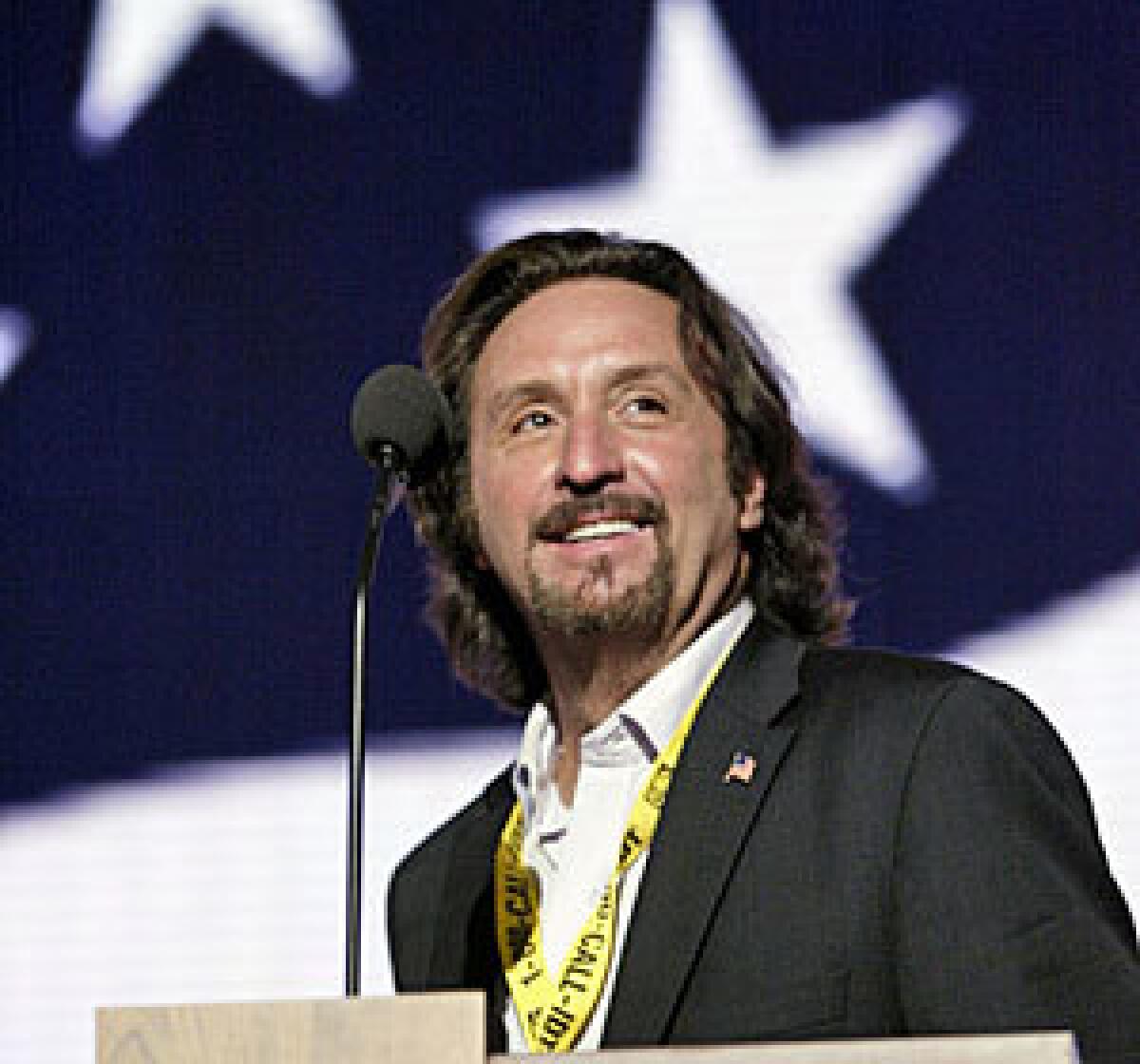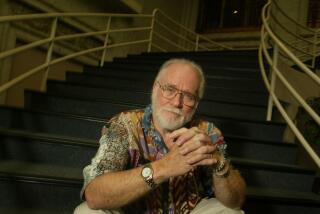Ron Silver dies at 62; Tony-winning actor and political activist

Ron Silver, the Tony Award-winning actor who amassed an impressive list of roles based on real-life figures in movies including “Reversal of Fortune” and “Ali,” died Sunday. He was 62.
Silver, a longtime liberal political activist who became an outspoken supporter of former President George W. Bush’s military response to 9/11, died of esophageal cancer in New York, according to Robin Bronk, executive director of the Creative Coalition, which he helped found.
During his nearly four-decade career, Silver appeared in films such as the critically acclaimed “Enemies: A Love Story,” a 1989 tragicomedy in which he starred as a married immigrant Polish Jew living in post-World War II Coney Island and having an affair.
On TV, he received Emmy Award nominations for his supporting role in the 1987 miniseries “Billionaire Boys Club” and, in 2002, for his recurring role as presidential campaign advisor Bruno Gianelli on “The West Wing.”
On Broadway, he won both a Tony Award and a Drama Desk award in 1988 for best actor as the loathsome Hollywood movie producer in David Mamet’s “Speed-the-Plow” -- “the performance of his career,” proclaimed New York Times critic Frank Rich.
But through the years, Silver’s steady work as an actor vied with his off-stage role as a political activist.
He campaigned for Bill Clinton for president; attended the Democratic national conventions in 1992 and 2000; and vocally expressed liberal views on abortion, gay rights, stem cell research and other issues.
But the terrorist attacks of Sept. 11, 2001, marked a turning point for the actor-activist, who delivered a rousing endorsement of Bush at the Republican National Convention in 2004.
“The president is doing exactly the right thing,” exclaimed Silver, who brought the cheering delegates to their feet, “and that is why we need this president at this time.”
In a 2005 interview with The Times, Silver said, “It sounds like a conversion tale, but I was not reborn. It was fairly consistent with my views in the past. I’ve been a very aggressive liberal interventionist in my foreign policy feelings. I have felt for a long time that the withdrawal of American power was far more dangerous than getting involved.”
He quickly discovered, however, that his backing of the Bush administration took something of a toll in Hollywood.
“There have been a few occasions when people have said, ‘I won’t work with that S.O.B.,’ ” he said. “It has happened, but on an individual basis. It is not in any way, shape or form a blacklist.
“In this business, there are a million different reasons people don’t want to work with you: You’re too Jewish, you’re not Jewish enough, they want a bigger star, they think you cost too much money. Most people are very economical with the truth out here, so it’s very hard to determine cause and effect.”
As for those who mock celebrity participation in politics, Silver told the New York Times in 1993: “What do you want us to do? Have affairs? Become drug addicts? We have a certain visibility and power in the society. We’re a celebrity-driven society. Why not use that to try to do a little good?”
In 1989, Silver became founding president of the Creative Coalition, a nonprofit, nonpartisan social and political advocacy organization made up of arts and entertainment figures.
He served as president of the Actors’ Equity Assn., the labor union that represents actors and stage managers, from 1991 to 2000.
And he was a founding member of One Jerusalem, an educational foundation with a goal of “maintaining a united Jerusalem as the undivided capital of Israel.”
Silver, who attended Columbia University’s Graduate School of International Affairs, also was a member of the Council on Foreign Relations, as well as being a member of the program committee of the Woodrow Wilson International Center for Scholars, and a founding member of the board of directors for New York City Public/Private Initiatives Inc.
As he told the New York Times in 1993, “I’m an actor by calling but an activist by inclination.”
“I used to laugh about Ron’s politics,” Joe Mantegna, who appeared in “Speed-the-Plow” with Silver, told People magazine in 1990. “When my friends came to the play, it was, like, Tony Bennett. With Ron it was, ‘Oh, I want you to meet Sen. Moynihan.’ ”
As an actor, Silver raised his profile considerably by making something of a specialty of playing true-life figures in films and TV movies.
In the 1990 drama “Reversal of Fortune,” he played defense lawyer Alan Dershowitz, and he was boxing trainer Angelo Dundee in the 2001 drama “Ali.”
Silver also played former Secretary of State Henry Kissinger in the 1995 TNT TV movie “Kissinger and Nixon”; chauvinist, over-the-hill tennis champ Bobby Riggs in the 2001 ABC TV movie “When Billie Beat Bobby”; and defense attorney Robert Shapiro in the 2000 CBS miniseries”American Tragedy.”
On stage, Silver played rock impresario Bill Graham in a one-man play, “Bill Graham Presents,” at the Canon Theater in Beverly Hills in 2000.
In addition to “Speed-the-Plow,” he also appeared on Broadway in the 1980s in David Rabe’s star-studded, caustic Hollywood-set play “Hurlyburly,” directed by Mike Nichols; and he co-starred with Marlo Thomas in Andrew Bergman’s Nichols-directed comedy “Social Security.”
Silver, whose numerous film credits include “Garbo Talks,” “Blue Steel” and “Timecop,” also had continuing roles in the TV series “Rhoda,” “Wise Guy,” “Veronica’s Closet” and “Chicago Hope.” And in 1982, he starred as an undercover cop in the short-lived CBS sitcom “Baker’s Dozen.”
Silver was born in New York City on July 2, 1946, and grew up on Manhattan’s Lower East Side.
After graduating from State University of New York at Buffalo, he received a master’s degree in Chinese history from St. John’s University in New York and the College of Chinese Culture in Taiwan.
Exempt from the draft as a student, Silver traveled to Vietnam, Cambodia, India, Japan and the Soviet Union in the late ‘60s before returning home. He worked brief stints as a high school teacher and a social worker and began studying acting, first with Herbert Berghof and then with Lee Strasberg at the Actors Studio.
He made his New York stage debut in 1971. Four years later, he moved to Los Angeles with the hit off-Broadway revue “El Grande de Coca-Cola” and began working in television and films.
Information on survivors was incomplete Sunday.
More to Read
Start your day right
Sign up for Essential California for the L.A. Times biggest news, features and recommendations in your inbox six days a week.
You may occasionally receive promotional content from the Los Angeles Times.






